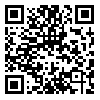1. 1. Lavaf H, Shokri O. The mediating role of couples’ communication patterns in the relationship between marital conflict and internalized and externalized disorders in girls. J Family Psychology. 2015;1(2):3–18. [Persian] [
Article]
2. 2. Davis D, Shaver PR, Vernon ML. Physical, emotional, and behavioral reactions to breaking up: the roles of gender, age, emotional involvement, and attachment style. Personality and Social Psychology Bulletin. 2003;29(7):871–84. [
DOI]
3. 3. American Psychiatric Association. Diagnostic and Statistical Manual of Mental Disorders: DSM-5. 5th ed. Washington, D.C: American Psychiatric Association; 2013.
4. 4. Gottman JM, Tabares A. The effects of briefly interrupting marital conflict. Journal of Marital and Family Therapy. 2018;44(1):61–72. [
DOI]
5. 5. Khojasteh Mehr R, Parsi E, Shirali Nia K. The moderating role of positive emotion on the relationship between negative emotion and destructive marital exchanges in women. Journal of Family Psychology. 2015;2(1):49–58. [Persian] [
Article]
6. 6. Sanford K. Communication during marital conflict: when couples alter their appraisal, they change their behavior. Journal of Family Psychology. 2006;20(2):256–65. [
DOI]
7. 7. Xu M, Thomas PA, Umberson D. Marital quality and cognitive limitations in late life. Journals of Gerontology: Series B. 2016;71(1):165–76. [
DOI]
8. 8. Derrick JL, Houston RJ, Quigley BM, Testa M, Kubiak A, Levitt A, et al. (Dis)similarity in impulsivity and marital satisfaction: a comparison of volatility, compatibility, and incompatibility hypotheses. Journal of Research in Personality. 2016;61:35–49. [
DOI]
9. 9. Gray JS, Coons JV. Trait and goal similarity and discrepancy in romantic couples. Personality and Individual Differences. 2017;107:1–5. [
DOI]
10. 10. Ostenson JA, Zhang M. Reconceptualizing marital conflict: a relational perspective. Journal of Theoretical and Philosophical Psychology. 2014;34(4):229–42. [
DOI]
11. 11. Lundblad A-M, Hansson K. Couples therapy: effectiveness of treatment and long-term follow-up. J Family Therapy. 2006;28(2):136–52. [
DOI]
12. 12. Johnson S, Zuccarini D. Integrating sex and attachment in emotionally focused couple therapy. Journal of Marital and Family Therapy. 2010;36(4):431–45. [
DOI]
13. 13. McKinnon JM, Greenberg LS. Vulnerable emotional expression in emotion focused couples therapy: relating interactional processes to outcome. J Marital Fam Ther. 2017;43(2):198–212. [
DOI]
14. 14. Burgess Moser M, Johnson SM, Dalgleish TL, Lafontaine M-F, Wiebe SA, Tasca GA. Changes in relationship-specific attachment in emotionally focused couple therapy. J Marital Fam Ther. 2016;42(2):231–45. [
DOI]
15. 15. Greenman PS, Johnson SM. United we stand: emotionally focused therapy for couples in the treatment of posttraumatic stress disorder. J Clinical Psychology. 2012;68(5):561–9. [
DOI]
16. 16. Doss BD, Thum YM, Sevier M, Atkins DC, Christensen A. Improving relationships: mechanisms of change in couple therapy. Journal of Consulting and Clinical Psychology. 2005;73(4):624–33. [
DOI]
17. 17. Karbala’i M, Azari E. Asar bakhshi darman hayajan madar bar samimi’at zanashoo’i va kahesh delzadegi zanashoo’i zojeyn moraje’e konande be marakeze moshavere mantaghe 2 Tehran [The effectiveness of emotion-focused therapy on marital intimacy and reduction of marital burnout in couples referred to counseling centers in district 2 of Tehran]. Journal of Psychology and Educational Sciences. 2017;3(1&2):108–17. [Persian]
18. 18. Welch TS, Lachmar EM, Leija SG, Easley T, Blow AJ, Wittenborn AK. Establishing safety in emotionally focused couple therapy: a single‐case process study. J Marital Fam Ther. 2019;45(4):621–34. [
DOI]
19. 19. Wittenborn AK, Liu T, Ridenour TA, Lachmar EM, Mitchell EA, Seedall RB. Randomized controlled trial of emotionally focused couple therapy compared to treatment as usual for depression: outcomes and mechanisms of change. J Marital Fam Ther. 2019;45(3):395–409. [
DOI]
20. 20. Glasser W. Choice theory: a new psychology of personal freedom. First edition. New York: Harper Collins; 1998, pp:30–1.
21. 21. Yahyaee GA, Nooranipoor R, Shafiabadi A, Farzad V. The effectiveness of reality therapy on the improvement of couples’ family functioning. Archeives of Hygiene Sciences. 2015;4(3):120–7. [
Article]
22. 22. Grills C, Villanueva S, Anderson M, Corsbie-Massay CL, Smith B, Johnson L, et al. Effectiveness of choice theory connections: a cross-sectional and comparative analysis of California female inmates. Int J Offender Ther Comp Criminol. 2015;59(7):757–71. [
DOI]
23. 23. Shadish WR, Baldwin SA. Meta‐analysis of MFT interventions. Journal of Marital and Family Therapy. 2003;29(4):547–70. [
DOI]
24. 24. Fletcher GJ, Simpson JA, Thomas G. The measurement of perceived relationship quality components: a confirmatory factor analytic approach. Personality and Social Psychology Bulletin. 2000;26(3):340–54. [
DOI]
25. 25. Nilforooshan P, Navidian A. Composition of spouses’ attachment dimensions on marital satisfaction. Journal of Fundamentals of Mental Health. 2014;16(63):200–12. [Persian] [
Article]
26. 26. Johnson SM. The practice of emotionally focused couple therapy: creating connection. 2nd ed. New York/Hove: Routledge; 2012, pp:129–92.
27. 27. Glasser W, Glasser C. Getting together and staying together: solving the mystery of marriage. New York: Harper Collins; 2010, pp:48–64.
28. 28. Johnson S. Attachment in action–changing the face of 21st century couple therapy. Current Opinion in Psychology. 2019;25:101–4. [
DOI]
29. 29. Christensen A, Doss BD. Integrative behavioral couple therapy. Current Opinion in Psychology. 2017;13:111–4. [
DOI]
30. 30. Christensen A. Therapy. In: Christensen A, Jacobson NS, editors. Acceptance and Change in Couple Therapy. New York: Norton; 1998. pp: 225–35.
31. 31. Hajhosseini M, Zandi S, Saninejad S. Efficacy of PAIRS group psycho-education on marital satisfaction of pregnant women. Frooyesh. 2017;6(2):221–38. [Persian] [
Article]
32. 32. Holley SR, Haase CM, Chui I, Bloch L. Depression, emotion regulation, and the demand/withdraw pattern during intimate relationship conflict. Journal of Social and Personal Relationships. 2018;35(3):408–30. [
DOI]
33. 33. McCoy A, Rauer A, Sabey A. The meta marriage: links between older couples’ relationship narratives and marital satisfaction. Family Process. 2017;56(4):900–14. [
DOI]

 ، فرناز کشاورزی ارشدی*
، فرناز کشاورزی ارشدی* 
 1، فریبا حسنی1
1، فریبا حسنی1 
 ، سوزان امامی پور1
، سوزان امامی پور1 




